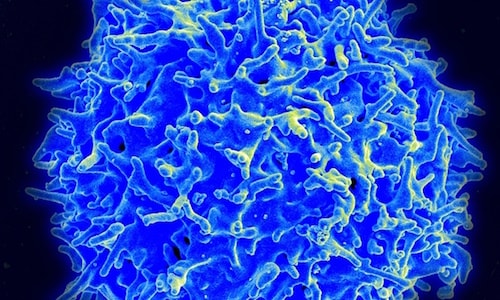Immunotherapy may cure late-stage leukemia
(Baonghean.vn) - More than half of critically ill leukemia patients participating in a trial of a therapy showed complete remission after the initial treatment period.
Scientists have just announced a breakthrough in cell transformation technology to treat leukemia by using T-cells in the immune system to attack cancer cells. Many patients with terminal leukemia who were diagnosed with only a few months of life extension after participating in experimental treatment using T-cells have had “record success” results.
94% of patients with acute lymphoblastic leukemia (ALL) after being treated with this method no longer had detectable cancer cells. For patients with other blood cancers, the recovery rate was more than 80%, of which more than 50% had a complete recovery.
 |
| A human T-cell under a microscope. “T-cells are living pills that can stay in the body for the rest of your life,” says researcher Chiara Bonini. Photo: Alamy |
Chiara Bonini, a hematologist at San Raffaele University in Milan, Italy, said she had never seen such a record recovery in her 15 years of research. “It’s truly revolutionary,” she said.
“This is a living therapy,” said Bonini. “When the T-cells are returned to the patient, they multiply.”
To perform the therapy, immune cells will be separated from the patient's body, then attached with "sensing" molecules that know how to find and destroy cancer cells. The mechanism of these cells is similar to the mechanism of destroying flu viruses or other infectious diseases. These cells will then be put back into the patient's body.
The trial has only been conducted on certain types of blood cancer, and scientists say there is still a lot of work to be done to destroy tumors and monitor how long the recovery lasts. In many cases, cancer cells can hide so well that the immune system cannot detect them, or they can overwhelm and overwhelm the immune system.
“There are many reasons for optimism, and many reasons for caution,” said researcher Stanley Riddell of the Fred Hutchinson Cancer Research Center in Washington state, adding that scientists hope that cutting the number of T-cells used in treatment will reduce the risk of side effects.
T-cell therapy is considered a last resort because reprogramming the immune system comes with risks, such as cytokine release syndrome (sCRS) and immune cell overload. Of the patients in the trial, 20 developed fever, low blood pressure, and neurological effects due to sCRS, and two died afterward. However, scientists also pointed out that chemotherapy had previously failed in all patients in the trial.
However, scientists still have high hopes for immunotherapy in cancer treatment, especially the transformation of cellular memory that can bring long-term effects. Accordingly, the ability of reprogrammed T-cells to remember cancer cells can last up to 10 years and automatically destroy them if cancer cells return.
Thanh Hien
(According to The Guardian)
| RELATED NEWS |
|---|

